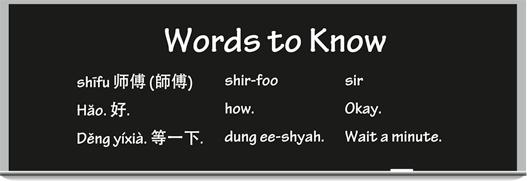Chinese For Dummies (54 page)
Read Chinese For Dummies Online
Authors: Wendy Abraham
 Chinese people generally don't eat any raw food. The idea of a raw salad bar is truly foreign to them. In fact,
Chinese people generally don't eat any raw food. The idea of a raw salad bar is truly foreign to them. In fact,
shÄngcà i
çè
(shung-tsye) (
lettuce
) literally translates as raw food, and the Chinese generally consider it fit only for farm Âanimals.
Making comparisons
 When you want to compare people or objects, you generally put the word
When you want to compare people or objects, you generally put the word
bÇ
æ¯
(
bee)
(compared to) between two nouns, followed by an adjective: A
bÇ
B (adjective). This construction means
A is more ____ than B
.
Here are a few examples:
PÃngguÇ bÇ júzi hÇochÄ«.
è¹ææ¯æ¡å好å
. (
èææ¯æ©å好å
.)
(peeng-gwaw bee jyew-dzuh how-chir.) (
Apples are tastier than oranges.
)
TÄ bÇ nÇ niánqÄ«ng.
她æ¯ä½ å¹´è½»
(
å¹´è¼
). (tah bee nee nyan-cheeng.) (
She's younger than you.
)
Zhèige fà nguÇr bÇ nèige fà nguÇr guì.
è¿ä¸ªé¥é¦æ¯é£ä¸ªé¥é¦è´µ
. (
éå飯館æ¯é£å飯館貴
.) (jay-guh fahn-gwar bee nay-guh fahng-gwar gway.) (
This restaurant is more expensive than that one.
)
How much is that thousand-year-old egg?
When you're ready to buy some foodstuffs, here are two simple ways to ask how much the products cost:
 DuÅshÇo qián?
DuÅshÇo qián?
å¤å°é±
? (
å¤å°é¢
?) (dwaw-shaow chyan?) (
How much money is it?
)
 JÇkuà i qián?
JÇkuà i qián?
å åé±
? (
å¹¾å¡é¢
?) (jee-kwye chyan?) (Literally:
How many dollars does it cost?
)
The only difference between the two questions is the implied amount of the cost. If you use the question word
duÅshÇo
å¤å°
(dwaw-shaow),
you want to inquire about something that's most likely more than $10. If you use
jÇ
å
(
å¹¾
) (jee) in front of
kuà i
å
(
å¡
) (kwye) (
dollars
), you assume the product costs less than $10. (You can also use
jÇ
in front of
suì
å²
(
æ²
) (sway) (
years
) when you want to know how old a child under 10 is.)
Talkin' the Talk
 At the local open-air market in Kaifeng, Margaret and Emmanuel eye some vegetables and discuss the price with the older man selling them in his stall. (Track 11)
At the local open-air market in Kaifeng, Margaret and Emmanuel eye some vegetables and discuss the price with the older man selling them in his stall. (Track 11)
Margaret:
ShÄ«fu, qÇng wèn, nÇ yÇu méiyÇu bÅcà i?
shir-foo, cheeng one, nee yo mayo baw-tsye?
Sir, may I ask, do you have any spinach?
Shīfu:
DÄngrán. Yà o jÇjÄ«n?
dahng-rahn. yaow jee-jeen?
Of course. How many kilograms would you like?
Emmanuel:
WÇmen mÇi sÄnjÄ«n, hÇo bùhÇo?
waw-men my sahn-jeen, how boo-how?
Let's get three kilograms, okay?
Margaret:
HÇo. SÄnjÄ«n ba.
how. sahn-jeen bah.
Okay. It'll be three kilograms then.
Shīfu:
Méi wèntÇ. YìjÄ«n sÄn kuà i qián. Nèmme, yiÃgòng jiÇ kuà i.
may one-tee. ee-jeen sahn kwye chyan. nummuh, ee-goong jyoe kwye.
No problem. It's $3 a kilogram. So that will be $9 Âall together.
Emmanuel:
DÄng yÃxià . BÅcà i bÇ gà ilán guì duÅle. WÇmen mÇi gà ilán ba.
dung ee-shyah. baw-tsye bee guy-lahn gway dwaw- luh. waw-mun my guy-lahn bah.
Wait a minute. Spinach is more expensive than Chinese broccoli. Let's buy Chinese broccoli then.
Shīfu:
HÇo. Gà ilán liÇngkuà i yìjÄ«n. Hái yà o sÄnjÄ«n ma?
how. guy-lahn lyahng-kwye ee-jeen. hi yaow sahn-jeen mah?
Okay. Chinese broccoli is $2 a kilogram. Do you still want three kilograms?
Margaret:
Shì de.
shir duh.
Yes.
Shīfu:
Nà , sÄnjÄ«n yÃgòng liù kuà i.
nah, sahn-jeen ee-goong lyo kwye.
In that case, three kilograms will be $6.
Emmanuel:
HÇo. Zhè shì liù kuà i.
how. juh shir lyoe kwye.
Okay. Here's $6.
Shīfu:
Xièxiè.
shyeh-shyeh.
Thank you.
Emmanuel:
Xièxiè. Zà ijià n.
shyeh-shyeh. dzye-jyan.
Thanks. Goodbye.
Shīfu:
Zà ijià n.
dzye-jyan.
Goodbye.

 Shīfu
Shīfu
å¸å
(
師å
) (shir-foo) is a term used to indicate someone providing a service; it shows more respect due to age than the term
fúwùyuán
æå¡å
(
æåå¡
) (foo-woo-ywan), which indicates any kind of attendant, does.
 Â Fun & Games
 Fun & Games
